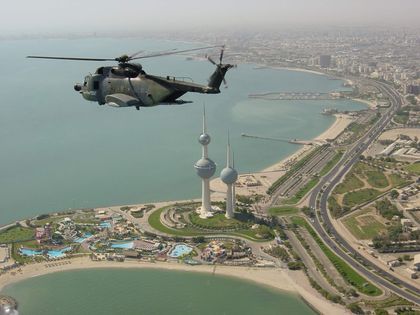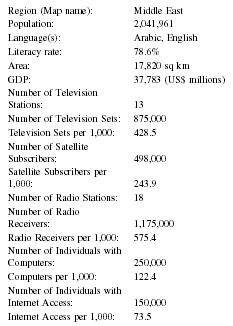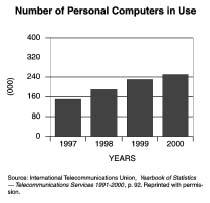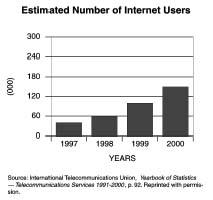Kuwait

Basic Data
| Official Country Name: | State of Kuwait |

| Region (Map name): | Middle East |
| Population: | 2,041,961 |
| Language(s): | Arabic, English |
| Literacy rate: | 78.6% |
| Area: | 17,820 sq km |
| GDP: | 37,783 (US$ millions) |
| Number of Television Stations: | 13 |
| Number of Television Sets: | 875,000 |
| Television Sets per 1,000: | 428.5 |
| Number of Satellite Subscribers: | 498,000 |
| Satellite Subscribers per 1,000: | 243.9 |
| Number of Radio Stations: | 18 |
| Number of Radio Receivers: | 1,175,000 |
| Radio Receivers per 1,000: | 575.4 |
| Number of Individuals with Computers: | 250,000 |
| Computers per 1,000: | 122.4 |
| Number of Individuals with Internet Access: | 150,000 |
| Internet Access per 1,000: | 73.5 |
Background & General Characteristics
Kuwait is a Middle Eastern country strategically bordered on the east by the Persian Gulf and precariously sandwiched between Iraq on the north and west, and Saudi Arabia on the south and west. Hosting a land area of 6,877 square miles, a desert-like climate, and a population of 2,500,000 Kuwait has provided a theater for ongoing territorial disputes, disputes which have impacted the free flow of information in that and surrounding countries.
Although English is widely spoken, the official language of Kuwait is Arabic. The population is 85 percent Muslim, with Protestant and Catholic Christianity, Hindu, Parsi and other religions combined accounting for the remaining 15 percent. The literacy rate for Kuwaitis is approximately 79 percent.
History
Kuwait is classified as a constitutional monarchy and has been a fully independent country since June 19, 1961. No political parties are allowed and voting is restricted to qualifying Kuwaiti males over age 21. Although the state of Kuwait's civil legal system is significantly related to Islamic law, compulsory Islamic law for criminal justice has not been formally adopted.
Significant historical developmental periods of Kuwait demonstrate a diversity of political, financial, ethnic and religious influences. These eras include: early civilizations when the land now known as Kuwait was part of the B.C., West Asian Sumer Kingdom; the middle 18th century settlement by the Utub, an Arab group splintered from the Anizah tribe; 1756 when Sheikh Sabah bin Jaber I was chosen ruler; 1899 when Britain joined with Kuwait to help protect Kuwait's sovereignty which was threatened by Turkey; and 1961 which marked Kuwait's separation from Britain, although Britain continued to provide protection when Kuwait was threatened by Iraq. During the 1980s, Kuwait supported Iraq in its conflict with Iran, but Iraqi-Kuwaiti relations worsened and Iraq invaded Kuwait on August 2, 1990. Iraq's invasion impacted almost all aspects of Kuwaiti cultural, physical and political lifestyles, resulting in temporary media shut downs. After Iraq's occupation ended, the Kuwaiti government took steps to restore law and order and to move toward a population consisting of a majority of Kuwaitis, to be in part achieved by reducing the number of foreign persons allowed in Kuwait. In 2002, Kuwaitis constituted about 35 percent of the population. Issues of national security, immigration restrictions, and the influence of Islam in Kuwait, are among factors impacting the rebuilding of the modern press in Kuwait.
Newspapers and Other Publications
Modern Kuwait's print media had its beginning in the 1920s, expanding in the 1960s (Kamaliour & Mowlana) with the emergence of a number of publications. Most newspapers in Kuwait are individually owned, allowing for a wide range of expressions of opinion, but are limited to some degree in that speaking against the government or Islam is not allowed. Independent newspapers were somewhat challenged after Iraq's invasion, when the Kuwaiti government became involved in publishing news. However, government newspapers were discontinued because they could not compete with privately owned publications.
Arabic daily newspapers from Kuwait include: Al-Rai Ala-Am ( Public Opinion ) which started publication in 1961 and hosted a 2001 circulation of about 87,000; Al-Seyassah ( Policy ), founded in 1965, with a circulation of 70,000; and Al-Qabas ( Starbrand ), a somewhat liberal publication founded in 1972. Before the Iraqi invasion in 1990, Al-Qabas reportedly had a circulation of about 120,000, compared to its 2001 circulation of 79,000. In 2002, its online Arabic Al-Qabas site reported 30,000 weekly hits.
Another Arabic newspaper, Al-Watan ( The Home-land ), started publication in 1974 and had a 2001 circulation of 60,000. Al-Anbas ( The News ) was founded in 1976 and had a 2001 circulation of about 107,000. Other newspapers include Al Dostoor , a general interest publication; and Al Iklisadia , a business publication.
Newspapers published in English include the Kuwait Times , founded in 1961, with a 2001 circulation of 28,000; Kuwait Today ; and the Arab Times , founded in 1977 reporting a circulation of 42,000. The Washington Post is also received in Kuwait.
Weekly publications include Al-Mousaher , an economic publication; Murat al-Umma (Mirror of the Nations) with a circulation of 80,000; and Al Yaqza ( The Awakening ), a general and political publication founded in 1966, reporting in 2001 a circulation of 91,000. Al-Mujtamaa is a weekly Islamic magazine.
Other magazines include Al-Arabia ( Pioneer ), founded in 1958 reporting in 1994 a circulation of 360,000. The widely read educational journal which was halted because of the Iraqi invasion but restarted publication in 1991. Other publications include general interest magazines Al Forgan , Anhaar and Mishkat Al Rai ; Al-Nahda, Al-Moukhtalef, OusratyAnnasHayataniaAl-Majales, and Al-Balagh , a general and Islamic publication with a 2002 circulation of 29,000.
Other sources of information in Kuwait include the State of Kuwait Official Gazette , a Sunday weekly journal published since 1954 by the Ministry of Information (2002 circulation of 5,000), and Kuwait Magazine , published monthly since 1961. The Ministry of Defense publishes a monthly magazine, Homat Alwatan .
Economic Framework
The economy of Kuwait has moved from a poor nomadic lifestyle resulting from the desert-like condition of its land, to a somewhat thriving sea port based on its location on the Persian Gulf, to a somewhat diminished level after WWII, to one of the wealthiest nations in the world based on the discovery of oil in the 1930s. According to F.E. Kazan (Kamaliour & Mowlana), Oil is the prime mover that led to the economic prosperity of Kuwaiti society, attracted a diversified population to Kuwait, led to the increase in the literacy and urbanization rates, and finally led to progress in the levels of socioeconomic and political development. All these factors, in turn, ushered in the progress of Kuwaiti mass media. Further, by maintaining its ties with the East and with the West, Kuwait has been able to provide economic security and a high standard of living for its citizens.
Press Laws and Censorship
As a primary regulator of the media, the 1991 Kuwaiti constitution guaranteed freedom of press, but only within the limits of the law. Although freedom of the press is a concept associated with Kuwait, and in spite of the fact that the Kuwait News Agency (KUNA) is considered to be independent, certain agency structures and national laws limit free exercise. For instance, KUNA as a part of the Ministry of Information has historically controlled Radio Kuwait and the Kuwait Television stations.
In 1956 the first press law was passed. Then the 1961 Press and Publishing Law provided for such sanctions as fines and imprisonment for publishing materials critical of the government, rulers, other Arab states, allies of Kuwait or religious figures.
Another press law passed in 1976 provided for suspending the licenses of media sources who broke press laws, but later these restrictions were softened and the media began to monitor itself to some degree. However, beginning in 1986, the Ministry of Information required all publications to submit copy to the ministry in advance for approval and forbade criticism of the ruler and his family, other Arab leaders, and Islam, as well as the acceptance of foreign funding.
Censorship
Kuwaiti press laws have been enforced in a number of cases. For instance, the World Press Freedom Review reported an incident in which a publication which might be viewed as lending support to Iraq was banned from Kuwait; an incident in which a university professor was sentenced to prison for allegedly defaming Islam and others were fined for allegedly writing immoral poetry (2000); incidents in which a television station was banned for insulting the Emir, an offense against the Kuwaiti Constitution (1999); and an incident in which the editor-in-chief of a leading daily newspaper was sentenced to prison for allegedly insulting the Divine Being (1998).
State-Press Relations
Private media enjoys a great deal of freedom in Kuwait, yet is subject to governmental sanctions for violating news and publication laws. The press is economically dependent on state financial subsidies.
Attitude Toward Foreign Media
Kuwait depends to a large degree on its Western allies for defense. For instance, in 2002, The Associated Press reported that the United States planned to sell Kuwait missiles to help Kuwait protect itself against hostile neighbors. Such factors as Kuwait's continuing ties with both the East and the West present a sometime complex and incongruent situation for the media. Although foreign media is welcome in Kuwait, evidenced by Broadcasts from the BBC World Service, Voice of America, All India Radio and Pakistan Radio being received in Kuwait, sanctions for violation of Kuwait's publication laws apply. Kuwait extends accreditation to foreign correspondents, but there are instances in which publications and journalists have been banned from entering Kuwait.

Foreign bureaus include the Middle East News Agency, Egypt; New China News Agency; AFP, France; and the Associated Press, USA. Russia, Turkey, Libya and Germany are also represented. Online foreign news sources include Al Bawaba (Arabic/English) and Arabia (Arabic/English), as well as English sites: Kuwait Daily , Middle East News Online , MoreoverOne World , the Washington Post , and Zawya .
News Agencies and Associations
The Kuwait News Agency (KUNA) was established in 1976 as an independent institution, but functions as an arm of the Ministry of Information. The agency conducts research and provides information on general and special political and socioeconomic issues. In 1986, KUNA provided about 50,000 information releases, and was to become the leading Middle Eastern news agency. There is also an independent Kuwait Journalist Association.
Broadcast Media
The broadcast media in Kuwait does not have a history of independence. The Ministry of Information in Kuwait Aowns, finances, controls and manages radio and television media in Kuwait (Kamaliour & Mowlana).
Radio
The first radio broadcasts in Kuwait originated in 1951, and after Kuwait's liberation from Britain in 1961, the radio medium grew. After the Iraqi invasion in 1990, Kuwait radio continued to broadcast from other countries in efforts to encourage Kuwaiti citizens to remain loyal and reject Iraq's occupation of their country.
In 2002, Kuwaiti radio stations provide public programs 24 hours a day. There are various Arabic radio stations such as Radio Kuwait which broadcasts news, music and talk radio; a Super Station FM 99.7 which began in 1994; Radio Kuwait (English); two English FM stations; plus the American Armed Forces Radio.
Television
Kuwaiti television originally started in 1957 as a private enterprise, but after Kuwait gained its independence from Britain, control was given to the government. Iraq destroyed television facilities during the 1990 invasion, but after Iraqi occupation ended, Kuwait's links with the West again proved beneficial as it received financial support in rebuilding efforts. In 1998, efforts were made within Kuwait to allow television to be a private industry by the year 2000, but these efforts were subject to governmental approval.
There are 13 Kuwait Television broadcast stations, plus several satellite channels. Programs in Arabic and English are provided, including a sports station and the Kuwait Satellite Channel which started transmission in 1992.
Electronic News Media
In addition to television and radio, the development of movies and VCRs provided additional avenues for electronically communicating information. However, the introduction of the Internet provided unprecedented opportunities for freedom of the press throughout the world. In 2000, there were three Internet service providers and some 100,000 users in Kuwait.
The Palestinian/Israeli conflict has impacted the media in the Middle East, resulting in news releases which demonstrate the overlapping connections between the Kuwaiti government, the West, other Arab states and the press. For instance, in 2002, KUNA reported that Kuwaiti officials opposed using oil as a weapon to force Israel to withdraw from Palestinian territories.
Electronic News Media
The State of Kuwait provides information and images about history and culture. An English window for KuwaitOnline provides information on a variety of online resources. These include: Al-Forgan Magazine , the first online Islamic Magazine at the State of Kuwait; Online First Aid ; Al-Qadisia Club , an online sports club; and an interactive site KOL Corner for expressions of opinion.
Education & TRAINING
The University of Kuwait offers a Bachelor of Arts degree in the Department of Mass Communication. In addition, a graduate program in mass media was being prepared for addition to the curriculum. Students are taught how to translate news from Arabic to English and English to Arabic, and an internship program is required. A state of the arts computer lab is equipped for teaching electronic publishing, image processing and multimedia applications using Macintosh and Pentium formats. Undergraduate courses in advertising, radio, television, public relations and propaganda, research methodology, theory, Kuwaiti mass media history, ethics, law, and mass communication technology are taught. The Media Law emphasis provides information regarding Kuwaiti governmental regulation of print and broadcast media, including sanctions for violating publication laws.
Summary
Just as the country of Kuwait is geographically triangularly sandwiched between Iraq, Saudia Arabia and the freedom of the sea, Kuwaiti mass media seems to be sociologically triangularly sandwiched between Kuwait's political and economic loyalty to its citizens; its religious loyalty to Islam and other Arab nations; and its dedication to the concept of freedom of speech fundamental to democracy and Kuwait's ties with the West. In 2002, the ongoing tension between these competing ideological perspectives required Kuwaiti media to perform unique three ring, journalistic balancing acts.
Bibliography
The American School of Kuwait. Life in Kuwait, 2002. Available from http://www.ask.edu.kw/ .
Amman, J. Latest Internet content and technology group in the middle east formed by Arab, American and European investors, 2000. Available from http://www.middleeastevents.com/ .
ArabNet. Kuwait Culture, Media , 2002. Available from http://www.arab.net/ .
Central Intelligence Agency. The World Fact Book 2001 , Directorate of Intelligence, 2002. Available from http://www.odci.gov/cia/ .
Kamalipour, V.R., and H. Mowlana, eds. Mass Media in the Middle East: A comprehensive handbook by F.E. Kazan. Westport, CT: Greenword Press, 1994.
Kuwait Information Office. Kuwait at a Glance, 2002. Available from http://www.kuwait-info.org .
"News and Media from Kuwait," 2002. Available from http://www.kuwaitmission.com .
A Review of the Events of 2001: Facts in brief on Middle Eastern countries. Chicago: World Book, Inc, 2002.
World Press Freedom Review, 2002. Available from http://www.freemedia.at/wpfr/kuwait.html .
Duffy Wilks

Please consider my humble request.
Yours Sincerely,
Joel Chinan.